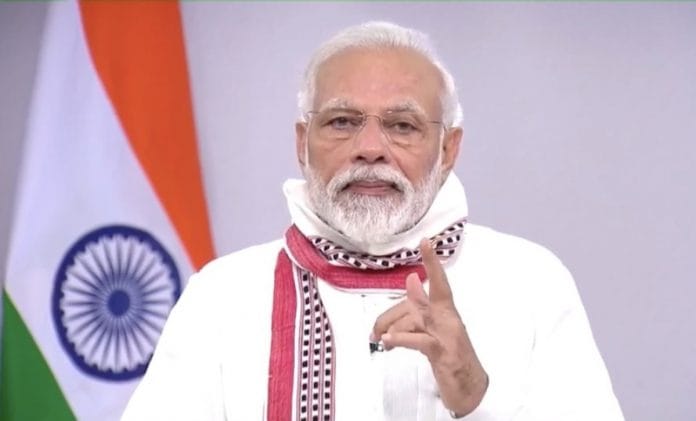Governments around the world say they’re engaged in a war against the coronavirus. Indian Prime Minister Narendra Modi invoked the legend of the Mahabharata, fought over 18 days, as he declared, with little warning, a devastating national lockdown.
British Prime Minister Boris Johnson, who always seems to be mentally screening a film of Winston Churchill in World War II, said that “we must act like any wartime government.”
Philippines President Rodrigo Duterte, who has long deployed bellicose language, most notoriously in his violent “war on drugs,” went further, advising the military and police that if quarantine violators “become unruly and they fight you and your lives are endangered, shoot them dead!”
This kill-or-die idiom is more than casual rhetorical overkill. Many governments are symbolically but very deliberately calling, in this time of fear and uncertainty, for general conscription along military lines.
This is so they can, while pointing to an insidious foreign enemy, aim their firepower against some of the most valuable institutions of domestic public life. They have been very successful so far. Last week, Duterte’s government shut down ABS-CBN television and radio, his country’s largest broadcasting service.
Things are not much better in countries with sturdier democratic institutions. Johnson’s Conservative government accused the British Broadcasting Corporation of bias after its flagship investigative program, Panorama, exposed shortages of personal protective equipment among healthcare workers.
The public broadcaster’s critique of the government was stinging in part because Johnson enjoys a high degree of support among Britain’s privately owned, overwhelmingly pro-Tory press. Nor does Modi, assured of craven public broadcasters, expect much criticism from the Indian media, which has been described, only semi-humorously, as veritably North Korean in its devotion to the supreme leader.
Modi held a virtual meeting with media editors and owners just before imposing his lockdown. According to his website, the attendees committed to “work on the suggestions of the prime minister to publish inspiring and positive stories” about Covid-19.
Also read: UP suspends labour laws: What stays, what goes and why ‘it is a step in right direction’
In addition to economic and military mobilization, wartime measures typically encourage a high degree of political, social and intellectual conformity. The general idea is that, in the face of an existential challenge from a vicious enemy, criticism of the government ought to cease.
The media tends to become more patriotic, as do former political partisans. Such was the case in the United States during the early stages of its wars in Afghanistan and Iraq, when most journalists and even Democratic politicians rallied around the Republican George W. Bush administration.
The trouble is that the “war” against Covid-19 is actually not a war at all. And no one should feel obliged to sign up for it.
The loss of, and separation from, loved ones, and the fear and anxiety that is devastating many lives is not an opportunity to fantasize about heroism in battle. The pandemic is, primarily, a global public health emergency; it is made potentially lethal as much by long neglected and underfunded social welfare systems as by a highly contagious virus.
A plain description like this is not as stirring as a call to arms — and doesn’t justify the more extreme actions governments have taken against critics during the crisis. It does, however, open up a line of inquiry that journalists ought to pursue, now as well as in the future.
According to the Indian government’s own statistics, its public spending on health before the pandemic measured just 1.17% of GDP, lower than Nepal and nowhere near comparable to South Korea’s 8.1%. Duterte no doubt wants his citizens to forget that as late as March 11, he told an audience: “I’ve been told, ‘You folks are too scared of this coronavirus epidemic’ and ‘Fools, don’t believe it.’”
Johnson, whose Conservative party presided over harsh cuts to health services, boasted, on the same day in early March that the U.K. government’s Scientific Advisory Group for Emergencies warned against shaking hands, “I shook hands with everybody, you will be pleased to know, and I continue to shake hands.”
Awakening late to the pandemic, authoritarian or authoritarian-minded leaders have turned it into an opportunity both to shore up their power and to conceal their stunning ineptitude. To fail to see through their manufactured fog of war, as many in the media are doing, can only further endanger the long-term moral and political health of their societies.-Bloomberg
Also read: Information panel wants Modi govt to relax RTI response deadline during lockdown







The same author will praise China for their actions on this virus. They are definitely living in their bubble and expecting the world to believe in their version. If it was suppression your article would not had come online. Hahahah
The same author will praise China for their actions on this virus. They are definitely living in their bubble.
Current democratic systems have failed to deliver for the majority of the global poor population. The system is designed to put rich people in power and control the world and making the rich richer and the poor even poorer. What is at stake now is to save every single life possible. What the author is expecting is for goverments to let the world to run normally and expect no loss of life. It is sometimes necessary to bring in a level of authoritarian rule to bring things to level for the masses as there is always an unruly class that need to be tamed.